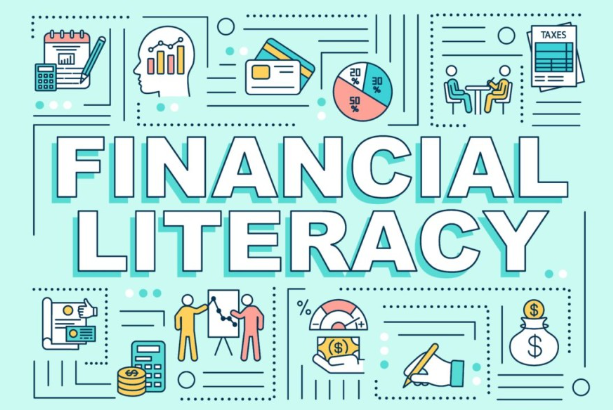Financial literacy is the ability to understand and effectively manage one’s finances. It involves knowledge and skills related to budgeting, saving, investing, borrowing, and managing debt. Essentially, it’s about being knowledgeable and confident in making financial decisions that can positively impact one’s present and future financial well-being.
Access exclusive content on the moneymortal platform and stay informed with valuable updates.
Key Takeaways:
- Financial literacy is essential for making informed decisions about your finances
- By mastering financial literacy, you can achieve financial security and freedom
- Budgeting, saving, investing, borrowing, and taxation are fundamental concepts of financial literacy
- Avoiding common financial pitfalls is crucial for long-term financial success
- Utilize resources like online tools, books, and courses to enhance your financial literacy

What is Financial Literacy?
Financial literacy is like a toolkit that equips individuals with the necessary skills and knowledge to navigate the complex world of finance. It encompasses various aspects of personal finance, including:
- Budgeting: Creating and sticking to a budget helps individuals manage their income and expenses effectively. It involves understanding where money is being spent and finding ways to allocate funds wisely.
- Saving: Saving money is crucial for achieving financial goals and building wealth over time. Financially literate individuals understand the importance of saving regularly and the various options available for saving, such as savings accounts, certificates of deposit (CDs), and retirement accounts.
- Investing: Investing involves putting money into assets with the expectation of generating a return. Financial literacy helps individuals understand different investment options, such as stocks, bonds, mutual funds, and real estate, as well as the associated risks and potential rewards.
- Borrowing: Many individuals need to borrow money at some point, whether it’s for purchasing a home, financing education, or covering unexpected expenses. Financial literacy involves understanding different types of loans, interest rates, and repayment terms, as well as the implications of taking on debt.
- Managing Debt: Debt can be a significant financial burden if not managed properly. Financial literacy includes knowing how to prioritize debt repayment, avoid excessive debt, and effectively manage existing debt through strategies like debt consolidation or refinancing.
Overall, financial literacy empowers individuals to make informed financial decisions that align with their goals and values, ultimately leading to greater financial stability and security.
Why Financial Literacy Matters:
Financial literacy is not just about balancing your budget; it’s about taking control of your financial future. By mastering financial literacy, you can:
- Make smarter financial decisions
- Build a strong financial foundation
- Reduce stress and anxiety about money
- Achieve your short-term and long-term financial goals
The Basics of Financial Literacy:
Budgeting:
- Create a budget to track your income and expenses
- Allocate your money wisely for necessities, savings, debt payments, and discretionary spending
Investing:
- Understand basic investment options such as stocks, bonds, and mutual funds
- Diversify your investments to minimize risk
Borrowing:
- Borrow money responsibly and understand the terms of any loans or credit agreements
- Avoid high-interest debt whenever possible
Taxation:
- Familiarize yourself with tax concepts such as deductions, credits, and tax brackets
- Maximize your tax benefits and minimize your tax liability legally
Avoiding Common Financial Pitfalls:
Many people fall into common financial traps, but with the right knowledge, you can avoid them:
- Overspending
- Ignoring Debt
- Neglecting Savings
- Failing to Invest
- Ignoring Taxation
Resources to Boost Your Financial Literacy:
MoneyMortal is committed to supporting you on your journey to financial literacy. Explore our curated selection of resources:
- Online Tools: Access free budgeting apps, calculators, and educational websites
- Books and Courses: Dive deeper into financial literacy with beginner-friendly books and online courses
Conclusion:
Congratulations! You’ve taken the first step towards mastering financial literacy with MoneyMortal. Remember, financial education is a lifelong journey, and we’re here to guide you every step of the way. With dedication and commitment, you can achieve financial security and freedom. Join our community today and unlock the keys to financial success.
FAQ’s
Why is financial literacy important?
Financial literacy is important because it equips individuals with the knowledge and skills needed to make informed financial decisions. It helps people manage their money more effectively, avoid costly mistakes, and work towards achieving their financial goals.
When should I start learning about financial literacy?
It’s never too early to start learning about financial literacy. Whether you’re a teenager, a young adult just entering the workforce, or someone nearing retirement, improving your financial literacy can have a positive impact on your financial well-being at any stage of life.
Where can I learn more about financial literacy?
There are many resources available for improving financial literacy, including books, websites, online courses, workshops, and personal finance apps. Additionally, seeking guidance from financial professionals, such as financial advisors or certified financial planners, can provide personalized advice and support.
